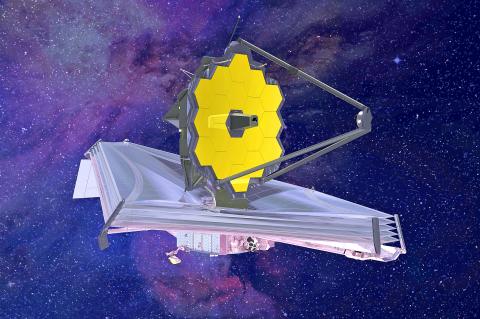NASA’s next-generation space telescope has been delayed yet again at a staggering cost of US$1 million a day.
For the third time in less than a year, the space agency on Wednesday announced a lengthy postponement for the James Webb Space Telescope.
The observatory would now fly no earlier than 2021; until last fall, it was on the books for a launch this year.

Photo: AP / Northrop Grumman / NASA
The telescope’s overall cost is now expected to reach nearly US$10 billion.
Development cost alone is to exceed the US$8 billion cap set by the US Congress by more than US$800 million and require reauthorization.
An independent review board cites worker error and embedded hardware problems for much of the escalating costs and delays.
In an acoustic test of the telescope earlier this year in California by prime contractor Northrop Grumman, dozens of loose fasteners — about 70 pieces in all — came off. A few pieces are still missing and could be inside the observatory.
In another mishap, an improper solvent was used to clean spacecraft propulsion valves. No one checked to see whether the cleaner might damage the equipment, review board chairman Tom Young said.
NASA was repeatedly over-optimistic in the work schedule, especially given the complexities and unique features of the Webb telescope, Young said, adding that its sunshield, the size of a tennis court once unfurled in space, is needed to keep the infrared telescope cold and is a major risk area.
Despite the many problems, the review board urges that the project continue given its “compelling” scientific potential and national importance, Young said.
Webb — considered a successor to the Hubble Space Telescope — is meant to peer farther into space and deeper into time than ever before. It is to operate from a point 1.6 million kilometers from Earth, unreachable by astronauts like the low-orbiting Hubble was.
“Make no mistake, I’m not happy sitting here having to share this story. We never want to do this. We always want to talk about the successes that we have,” NASA Science Mission Directorate associate administrator Thomas Zurbuchen said.
NASA should have been providing better oversight and is part of the problem along with Northrop Grumman, Zurbuchen said.
Besides improved oversight, he said there would be more quality control and more NASA engineers would be taking part in everything moving forward.
“We have to get this right here on the ground before we go to space,” Zurbuchen said. “Webb is worth the wait.”
The review board has issued 32 recommendations and NASA intends to implement them all, officials said.
NASA in September last year announced it was delaying Webb’s launch to next year. Then in March, the launch was postponed to 2020. Now it is March 30, 2021.
Young said if the board’s recommendations are “rigorously implemented,” then the date is feasible.

Drug lord Jose Adolfo Macias Villamar, alias “Fito,” was Ecuador’s most-wanted fugitive before his arrest on Wednesday, more than a year after he escaped prison from where he commanded the country’s leading criminal gang. The former taxi driver turned crime boss became the prime target of law enforcement early last year after escaping from a prison in the southwestern port of Guayaquil. Ecuadoran President Daniel Noboa’s government released “wanted” posters with images of his face and offered US$1 million for information leading to his capture. In a country plagued by crime, members of Fito’s gang, Los Choneros, have responded with violence, using car

CYBERCRIME, TRAFFICKING: A ‘pattern of state failures’ allowed the billion-dollar industry to flourish, including failures to investigate human rights abuses, it said Human rights group Amnesty International yesterday accused Cambodia’s government of “deliberately ignoring” abuses by cybercrime gangs that have trafficked people from across the world, including children, into slavery at brutal scam compounds. The London-based group said in a report that it had identified 53 scam centers and dozens more suspected sites across the country, including in the Southeast Asian nation’s capital, Phnom Penh. The prison-like compounds were ringed by high fences with razor wire, guarded by armed men and staffed by trafficking victims forced to defraud people across the globe, with those inside subjected to punishments including shocks from electric batons, confinement

The team behind the long-awaited Vera Rubin Observatory in Chile yesterday published their first images, revealing breathtaking views of star-forming regions as well as distant galaxies. More than two decades in the making, the giant US-funded telescope sits perched at the summit of Cerro Pachon in central Chile, where dark skies and dry air provide ideal conditions for observing the cosmos. One of the debut images is a composite of 678 exposures taken over just seven hours, capturing the Trifid Nebula and the Lagoon Nebula — both several thousand light-years from Earth — glowing in vivid pinks against orange-red backdrops. The new image

Canada and the EU on Monday signed a defense and security pact as the transatlantic partners seek to better confront Russia, with worries over Washington’s reliability under US President Donald Trump. The deal was announced after a summit in Brussels between Canadian Prime Minister Mark Carney and European Commission President Ursula von der Leyen and European Council President Antonio Costa. “While NATO remains the cornerstone of our collective defense, this partnership will allow us to strengthen our preparedness ... to invest more and to invest smarter,” Costa told a news conference. “It opens new opportunities for companies on both sides of the